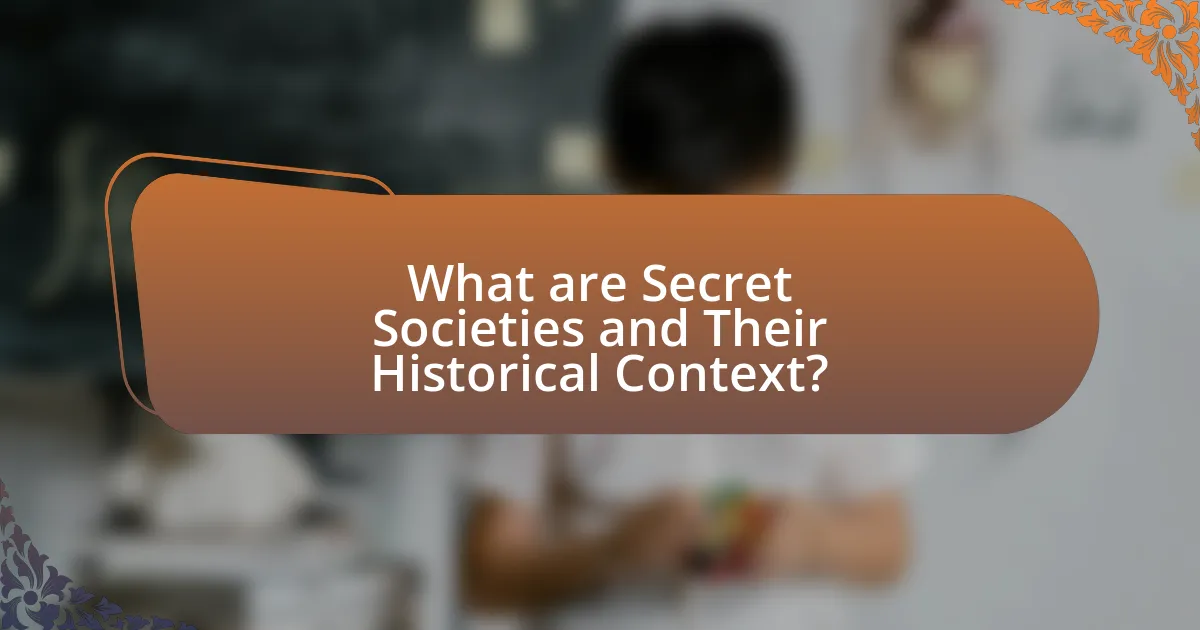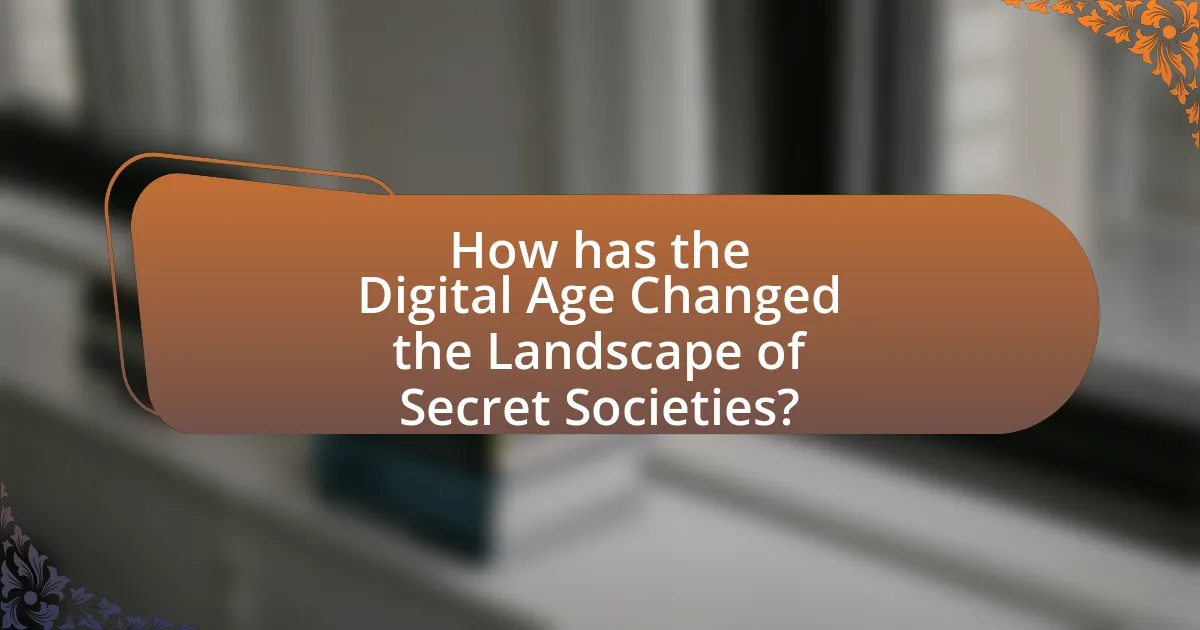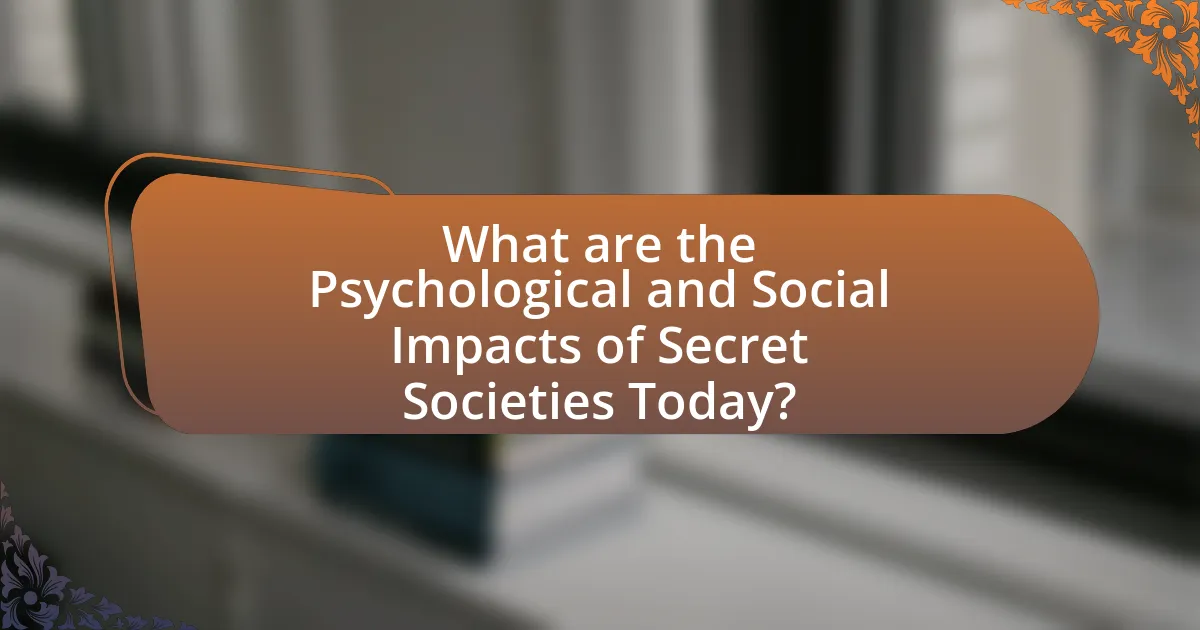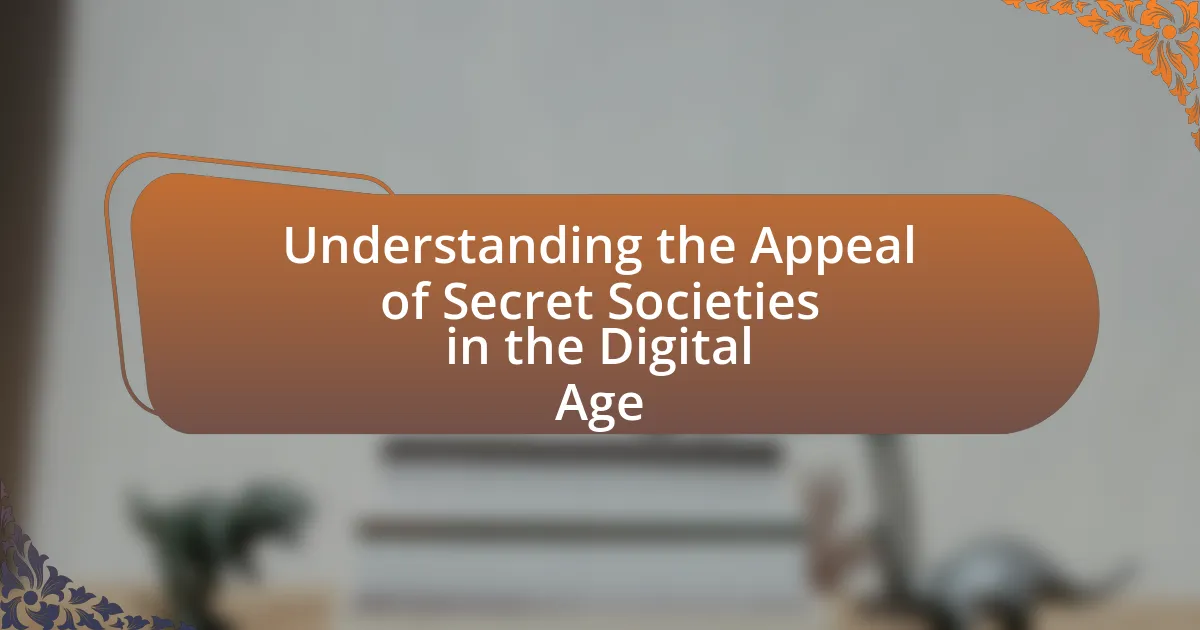Secret societies are clandestine organizations characterized by exclusive membership and hidden agendas, historically emerging in response to political and social upheaval. This article explores their evolution from ancient times to the digital age, examining the original purposes of these societies, the motivations for membership, and their impact on modern society. It highlights how digital communication has transformed their operations, enabling greater connectivity while posing risks of exposure. Additionally, the article addresses the psychological and social implications of secret societies, including their role in identity formation and the ethical responsibilities of their members.

What are Secret Societies and Their Historical Context?
Secret societies are organizations that operate in secrecy, often with exclusive membership and hidden agendas. Historically, these societies have emerged in various cultures, such as the Freemasons in the 18th century, which sought to promote Enlightenment ideals, and the Illuminati, founded in 1776, aimed at promoting rationalism and secularism. Their historical context includes periods of political upheaval and social change, where secrecy provided a means to protect members from persecution or to influence societal structures discreetly. For instance, during the French Revolution, secret societies played significant roles in shaping political discourse and action.
How have secret societies evolved over time?
Secret societies have evolved from exclusive, clandestine groups in ancient civilizations to more accessible organizations in the modern era. Historically, societies like the Freemasons and the Illuminati emerged in the 18th century, focusing on philosophical and political ideals, often in response to societal changes such as the Enlightenment. In contemporary times, the rise of the internet has transformed these societies, allowing for greater dissemination of information and recruitment, while also fostering new forms of online secretive communities. This evolution reflects a shift from physical gatherings to digital platforms, where anonymity and shared interests drive participation, illustrating how the fundamental allure of secrecy adapts to technological advancements.
What were the original purposes of early secret societies?
The original purposes of early secret societies included the promotion of mutual aid, the protection of members’ interests, and the pursuit of knowledge and enlightenment. These societies often emerged in response to social, political, or religious oppression, providing a safe space for individuals to share ideas and support one another. For instance, the Freemasons, founded in the late 16th to early 17th century, aimed to foster moral and ethical development among its members while advocating for social reform. Similarly, the Rosicrucians, established in the early 17th century, sought to promote esoteric knowledge and spiritual enlightenment. These foundational goals reflect the societies’ roles in addressing the needs of their members and influencing broader societal change.
How did historical events shape the formation of secret societies?
Historical events significantly influenced the formation of secret societies by creating environments of political, social, and religious turmoil that necessitated clandestine organization. For instance, the Enlightenment period fostered a climate of intellectual freedom and skepticism towards authority, leading to the establishment of groups like the Freemasons in the 18th century, which promoted Enlightenment ideals while providing a safe space for discussion and networking. Additionally, the French Revolution catalyzed the formation of various secret societies as individuals sought to navigate the chaos and protect their interests against oppressive regimes. The rise of totalitarian governments in the 20th century further propelled the creation of secret societies, as people sought refuge and solidarity in shared beliefs and objectives, often in opposition to authoritarian rule. These historical contexts illustrate how societal pressures and the quest for security and identity have shaped the evolution of secret societies throughout history.
Why do people join secret societies?
People join secret societies for a variety of reasons, including the desire for community, exclusivity, and shared interests. These organizations often provide a sense of belonging and identity, appealing to individuals seeking connection with like-minded peers. Additionally, the allure of secrecy and the promise of access to unique knowledge or experiences can be compelling motivators. Historical examples, such as the Freemasons, illustrate how these societies have historically offered networking opportunities and social capital, which can enhance personal and professional lives.
What motivations drive individuals to seek membership?
Individuals seek membership in secret societies primarily for a sense of belonging and community. This motivation is often driven by the desire for social connection, shared values, and the pursuit of common goals. Research indicates that individuals are attracted to these groups for the exclusivity and the promise of deeper interpersonal relationships, which can fulfill emotional and psychological needs. Additionally, the allure of secrecy and the potential for personal growth through unique experiences and knowledge sharing further enhance the appeal of membership in such societies.
How do social dynamics influence the appeal of secret societies?
Social dynamics significantly enhance the appeal of secret societies by fostering a sense of exclusivity and belonging among members. The desire for social connection drives individuals to seek out groups that offer unique experiences and shared values, which secret societies provide through their rituals and traditions. Research indicates that social identity theory supports this notion, as individuals often derive self-esteem from their group affiliations, making the allure of belonging to a secretive and elite organization particularly compelling. Furthermore, the mystique surrounding secret societies, often fueled by societal curiosity and the fear of the unknown, amplifies their attractiveness, as individuals are drawn to the perceived power and influence these groups may hold.
What role do secret societies play in modern society?
Secret societies play a multifaceted role in modern society, often serving as networks for social, political, and economic influence. These organizations can provide members with a sense of belonging, exclusive access to resources, and opportunities for collaboration that are not available in public spheres. For instance, groups like the Freemasons and the Skull and Bones have historically been linked to influential figures in politics and business, facilitating connections that can shape societal structures. Research indicates that the allure of secrecy and exclusivity contributes to their appeal, as individuals seek to align with powerful networks that can enhance their status and opportunities.
How do secret societies impact political and social movements?
Secret societies significantly influence political and social movements by providing a network for like-minded individuals to collaborate and strategize. These organizations often operate in secrecy, allowing members to share ideas and resources without public scrutiny, which can lead to the mobilization of collective action. For instance, the Freemasons have historically played a role in various political revolutions, such as the American Revolution, where their principles of liberty and fraternity inspired members to advocate for change. Additionally, the Skull and Bones society at Yale has been linked to the formation of influential political leaders, suggesting that such societies can shape leadership and policy direction. The clandestine nature of these groups can also create a sense of exclusivity and loyalty among members, further strengthening their impact on societal norms and political agendas.
What influence do they have on culture and community?
Secret societies significantly influence culture and community by fostering a sense of belonging and shared identity among their members. These organizations often promote unique values, rituals, and symbols that can shape cultural narratives and community dynamics. For instance, the Freemasons have historically contributed to social networks and charitable activities, impacting local communities through philanthropy and civic engagement. Additionally, the secrecy and exclusivity of these societies can create intrigue and curiosity, influencing popular culture through literature, film, and art that explore themes of mystery and hidden knowledge. This interplay between secret societies and cultural expression highlights their role in shaping societal norms and community interactions.

How has the Digital Age Changed the Landscape of Secret Societies?
The Digital Age has transformed the landscape of secret societies by facilitating greater communication, recruitment, and information dissemination. Online platforms enable these groups to connect with potential members globally, breaking geographical barriers that previously limited their reach. For instance, social media and encrypted messaging apps allow for discreet discussions and the sharing of ideologies, making it easier to maintain secrecy while expanding influence. Additionally, the availability of information online has led to increased scrutiny and exposure of secret societies, as investigative journalism and public interest can uncover their activities more readily than in the past. This duality of enhanced connectivity and potential exposure has fundamentally altered how secret societies operate and engage with the public.
What new platforms are used for secret society communication?
New platforms used for secret society communication include encrypted messaging apps like Signal and Telegram, as well as decentralized platforms such as Matrix and Discord. These platforms provide enhanced privacy features, allowing users to communicate securely and anonymously. For instance, Signal employs end-to-end encryption, ensuring that only the communicating users can read the messages, while Telegram offers secret chats with self-destructing messages. The use of these platforms reflects a growing trend among secret societies to leverage technology for secure communication in an increasingly digital world.
How do social media and online forums facilitate secret society activities?
Social media and online forums facilitate secret society activities by providing platforms for discreet communication and community building. These digital spaces allow members to share information, organize events, and recruit new members while maintaining anonymity. For instance, encrypted messaging apps and private groups on social media enable secure discussions that are less likely to attract public scrutiny. Additionally, the global reach of these platforms allows secret societies to connect with like-minded individuals across geographical boundaries, enhancing their recruitment and operational capabilities. The ease of creating pseudonymous accounts further protects the identities of participants, making it easier for secret societies to operate without detection.
What are the risks and benefits of digital communication for secret societies?
Digital communication offers both significant risks and benefits for secret societies. The primary benefit is enhanced connectivity, allowing members to communicate quickly and efficiently across vast distances, which can facilitate coordination and information sharing. For instance, encrypted messaging apps enable secure discussions, protecting sensitive information from external scrutiny.
Conversely, the risks include potential exposure to surveillance and hacking, which can compromise the confidentiality of communications. High-profile breaches, such as the 2016 Democratic National Committee hack, illustrate how digital vulnerabilities can lead to unauthorized access to private discussions and sensitive data. Additionally, the permanence of digital footprints can lead to unintended disclosures, as messages and data can be traced back to individuals or groups, undermining the secrecy that is fundamental to secret societies.
How do secret societies maintain secrecy in the digital age?
Secret societies maintain secrecy in the digital age through a combination of selective communication, encrypted messaging, and strict membership protocols. These organizations often utilize private networks and secure platforms to share information, ensuring that discussions remain confidential and inaccessible to outsiders. For instance, many secret societies employ end-to-end encryption tools like Signal or Telegram, which protect messages from interception. Additionally, they may limit access to sensitive information by implementing rigorous vetting processes for new members, thereby controlling who can participate in discussions. This approach is supported by historical practices of secrecy, as seen in groups like the Freemasons, who have long relied on coded language and symbols to convey messages discreetly.
What strategies do they employ to protect their information online?
Secret societies employ various strategies to protect their information online, including the use of encryption, secure communication platforms, and anonymity tools. Encryption ensures that sensitive communications are encoded, making it difficult for unauthorized parties to access the information. Secure communication platforms, such as Signal or Telegram, provide end-to-end encryption, enhancing privacy. Additionally, anonymity tools like VPNs and Tor help mask users’ identities and locations, further safeguarding their online activities. These strategies are essential for maintaining confidentiality and protecting members from potential surveillance or data breaches.
How do they navigate the challenges of digital surveillance?
They navigate the challenges of digital surveillance by employing encryption technologies and utilizing decentralized communication platforms. These methods protect their communications from unauthorized access and monitoring, ensuring privacy. For instance, the use of end-to-end encryption in messaging apps like Signal prevents third parties from intercepting messages, thereby maintaining confidentiality. Additionally, secret societies often adopt anonymity tools such as VPNs and Tor to obscure their online activities, further mitigating the risks associated with digital surveillance.

What are the Psychological and Social Impacts of Secret Societies Today?
Secret societies today have significant psychological and social impacts, primarily fostering a sense of belonging and identity among members while also contributing to societal division and mistrust. The psychological impact includes enhanced self-esteem and social support for individuals who feel marginalized, as these groups often provide a community that validates their beliefs and experiences. Conversely, the secrecy and exclusivity of these societies can lead to paranoia and conspiracy thinking, as members may become increasingly distrustful of outsiders and mainstream narratives.
Socially, secret societies can create in-groups that reinforce shared ideologies, which may lead to polarization within broader society. Research indicates that such groups can influence political and social movements, as seen in the rise of various fringe groups that leverage social media to recruit and spread their messages. For instance, studies have shown that online platforms facilitate the rapid dissemination of conspiracy theories, which can be linked to the activities of secretive organizations. This duality of fostering community while promoting division illustrates the complex role secret societies play in contemporary society.
How do secret societies fulfill psychological needs for their members?
Secret societies fulfill psychological needs for their members by providing a sense of belonging, identity, and purpose. Members often seek connection with like-minded individuals, which these organizations facilitate through exclusive networks and shared rituals. The secrecy and mystique surrounding these societies can enhance feelings of significance and empowerment, as individuals feel they are part of something larger than themselves. Additionally, the structured hierarchy and shared goals within secret societies can fulfill the human need for order and predictability, contributing to members’ psychological well-being. Research indicates that participation in such groups can lead to increased self-esteem and social support, reinforcing the psychological benefits they offer.
What sense of belonging do they provide?
Secret societies provide a profound sense of belonging by fostering exclusive communities where members share common values, beliefs, and experiences. This exclusivity creates a strong bond among members, as they often engage in rituals and traditions that reinforce their connection. Research indicates that belonging to such groups can fulfill psychological needs for acceptance and identity, as highlighted in studies on social identity theory, which emphasize the importance of group membership in shaping self-concept and emotional well-being.
How do they contribute to identity formation among members?
Secret societies contribute to identity formation among members by providing a sense of belonging and shared purpose. These organizations often create exclusive environments where individuals can connect over common beliefs, values, and experiences, fostering a collective identity. For instance, members may adopt specific symbols, rituals, or language unique to the society, which reinforces their affiliation and differentiates them from outsiders. Research indicates that participation in such groups can enhance self-esteem and personal identity, as individuals find validation and support within the community. This dynamic is particularly relevant in the digital age, where online platforms facilitate the formation of virtual secret societies, allowing members to engage and strengthen their identities through shared digital experiences.
What are the ethical implications of secret societies in the digital age?
The ethical implications of secret societies in the digital age include concerns about privacy, transparency, and the potential for manipulation. Secret societies can exploit digital platforms to operate covertly, raising issues of accountability as their activities often remain hidden from public scrutiny. For instance, the rise of encrypted communication tools allows these groups to share information without oversight, which can lead to the spread of misinformation or extremist ideologies. Additionally, the lack of transparency in their operations can undermine democratic processes, as decisions made within these societies may influence public policy without the consent of the governed. This dynamic highlights the tension between the right to privacy and the need for ethical governance in an increasingly interconnected world.
How do secret societies challenge societal norms and values?
Secret societies challenge societal norms and values by operating outside of mainstream societal structures, promoting alternative ideologies, and fostering exclusivity. These organizations often advocate for beliefs or practices that contradict established social conventions, such as secrecy, elitism, and nonconformity. For instance, the Freemasons have historically emphasized personal enlightenment and moral development, which can conflict with conventional religious or societal expectations. Additionally, secret societies can influence political and economic systems, as seen with groups like the Skull and Bones at Yale University, which has produced numerous influential leaders who may prioritize their society’s interests over public accountability. This ability to shape discourse and policy while remaining hidden from public scrutiny exemplifies how secret societies can disrupt traditional societal frameworks.
What responsibilities do members have towards transparency and accountability?
Members have the responsibility to uphold transparency and accountability by ensuring that their actions and decisions are open to scrutiny and that they adhere to ethical standards. This includes sharing relevant information with stakeholders, maintaining accurate records, and being answerable for their conduct within the organization. For instance, organizations that prioritize transparency often see increased trust and engagement from their members, as evidenced by studies showing that transparency can enhance organizational performance and member satisfaction.
What practical steps can individuals take if interested in secret societies?
Individuals interested in secret societies can begin by researching the history and purpose of various organizations, such as the Freemasons or the Rosicrucians, to understand their values and beliefs. Engaging in online forums and communities dedicated to discussions about secret societies can provide insights and connections with like-minded individuals. Attending lectures, workshops, or events related to esoteric knowledge or fraternity can also facilitate networking opportunities. Additionally, reading books and academic articles on the subject can deepen understanding and provide context about the societal impact of these groups. These steps are practical and grounded in the pursuit of knowledge and community engagement.
How can one research and identify legitimate secret societies?
To research and identify legitimate secret societies, one should start by examining historical records and reputable academic sources that document the existence and activities of such organizations. Scholarly articles, books, and databases like JSTOR or Google Scholar can provide credible information about well-known secret societies, such as the Freemasons or the Illuminati, detailing their origins, membership criteria, and societal impact. Additionally, attending lectures or seminars by historians or sociologists who specialize in secret societies can offer insights and firsthand knowledge. Engaging with primary sources, such as letters or documents from former members, can also help verify the legitimacy of these groups.
What should potential members consider before joining a secret society?
Potential members should consider the implications of secrecy and commitment before joining a secret society. The nature of secret societies often involves confidentiality, which can lead to ethical dilemmas and conflicts with personal values. Additionally, the level of commitment required can vary significantly; some societies demand substantial time and resources, impacting personal and professional life. Historical examples, such as the Freemasons, illustrate that members often face social and familial repercussions due to their involvement. Understanding these factors is crucial for making an informed decision about joining a secret society.
